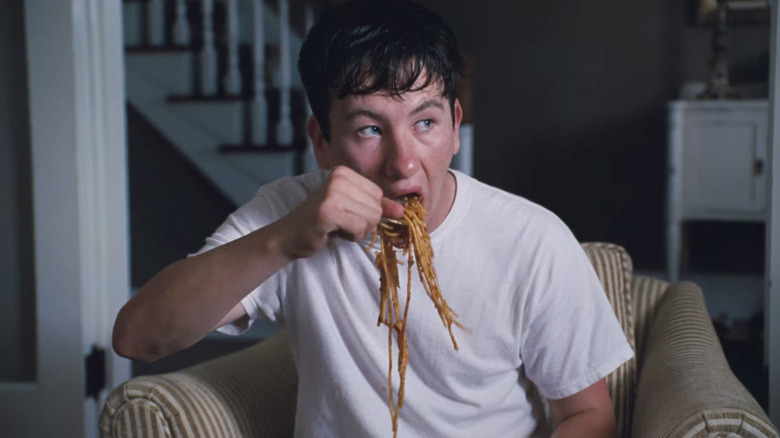The Horror Movie You Didn't Know Was Based On A Greek Tragedy
There's an old adage that storytellers are at their best when they stick to what they know, potentially even mining their own lives for the tales they choose to tell. In the case of celebrated Greek shock-teur Yorgos Lanthimos, one would have to hope he takes a different narrative approach. And if you've seen even one of Lanthimos' deliciously off-kilter movies you understand why as his singular cinematic confections have, to date, proven as utterly cringe-worthy as they are artistically and narratively ambitious. But if there's even a hint of an autobiographical element to films like 2009's "Dogtooth," 2011's "Alps," or 2015's "The Lobster," it's safe to assume Lanthimos has some seriously weird skeletons tucked away in his closet.
While we can't be entirely certain exactly where Yorgos Lanthimos drew his inspiration for those eerily twisted delights, we do have a much clearer idea of what inspired his two most recent movies. For 2019's Best Picture nominee "The Favourite" Lanthimos put his unique spin on the historical drama via a wonky, tragi-com farce centered around 18th-century royal Queen Anne (played by a never-better Olivia Colman) and the women vying for her attention at court (Rachel Weisz and Emma Stone respectively). As for his slow-burning 2017 suburban horror shocker "The Killing of a Sacred Deer," Lanthimos and his frequent writing partner Efthymis Filippou clearly borrowed heavily from a classic mythological tale spun from a master of Greek tragedy, Euripides.
The Killing of a Sacred Deer takes inspiration from a Euripedean tragedy
For those who have yet to witness the demented horrors of "The Killing of a Sacred Deer," it follows renowned surgeon Steven Murphy (Colin Farrell) whose life is upended when he meets a seemingly harmless teen named Martin (Barry Keoghan) and takes him under his wing. After ingratiating himself to Dr.Murphy's family, it becomes clear that fateful meeting was anything but chance as Martin eventually reveals himself as the son of a man who died on the operating table of the good doctor. More disturbingly, Martin reveals he's hatched a plot for payback, poisoning Steven's entire family and telling the doctor that he has to kill one of them in tribute for his father's life. And if he doesn't? Well, then the whole family dies.
If you think that maniacal story bears certain earmarks of Greek tragedy, you're right. Lanthimos obviously takes quite a few liberties with the original story, but the overarching plot of "The Killing of a Sacred Deer" has clear allegorical parallels to Euripedes' Greek tragedy "Iphigenia." That tragedy is named after the eldest daughter of Agamemnon, and it finds the Greek warrior tasked with sacrificing titular femme after accidentally killing – wait for it – a sacred deer in the gardens of the mighty goddess Artemis. In "Iphigenia," however the tradeoff is that, should Agamemnon not sacrifice the girl, he and his armies (en route to the Trojan Wars) would forever be stranded on Artemis' shores with the goddess withholding the winds necessary to escape by sea.
Yes, Euripedes' original tragedy is twisted in its own right. But Lanthimos perverts that tale in ways even the Greek master never could've imagined in "The Killing of a Sacred Deer," delivering a caustic, morally muddied, distinctly modern tale of vengeance that'll break both hearts and brains.

